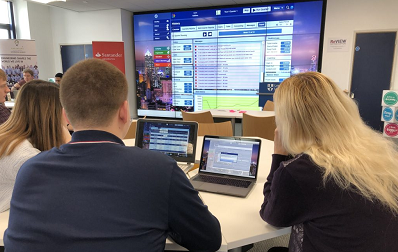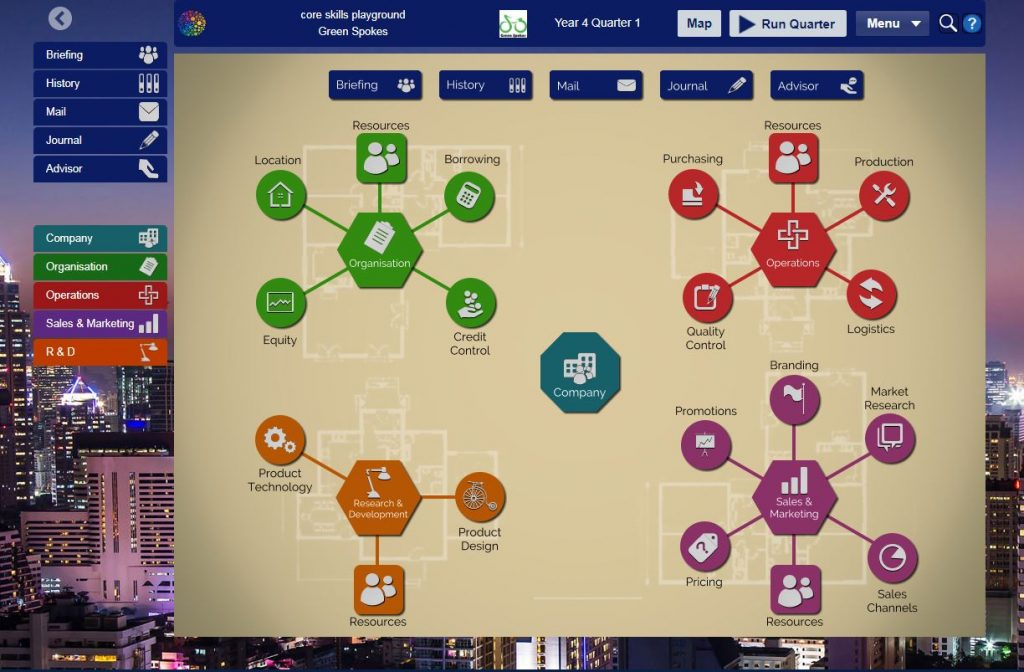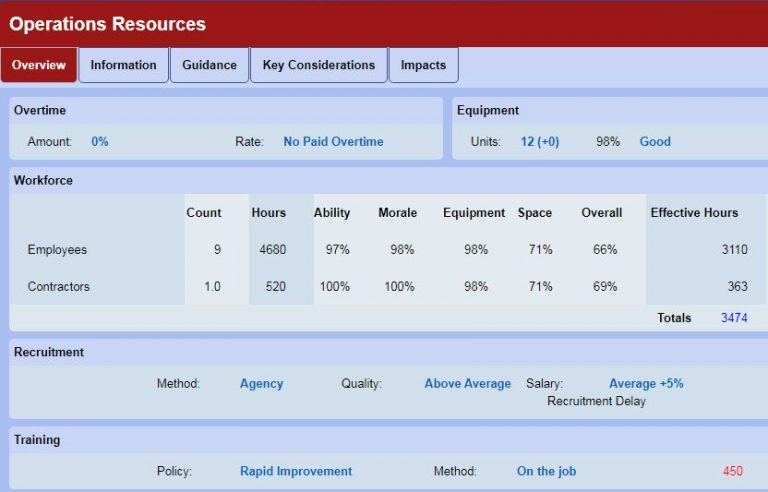Business simulation: stimulation for business learners

By Kevin Amor.
…simulations are perceived as educational and fun, a rare combination indeed! (Devasagyam, 2007)
Increasingly business schools and others tasked with teaching business skills are using business simulations as a key element of their offering (see for example Faria, 2009). As the name suggests, business simulations are software packages that simulate the running of a business.
Teams each run a business, often in competition, over a number of rounds, each of which represents a period of time (a year, for example). After each round the teams are given feedback on what happened as a consequence of their various business decisions made at the start of the round. This would include data such as financial, operations, sales and marketing and human resourcing reports.
Also, facilitators often provide feedback on issues such as how effective the teamworking and decision-making is going.

Are they better than lectures?
What benefits do simulations bring to the table?
Collaborative learning
Business simulations are typically run in groups. Each group represents a business. Often roles within the team may be allocated; for example, one learner will take the role of finance director, another operations, marketing and so forth. It is well established that more learning takes place when done collaboratively.
Competitive
Often simulations are run competitively and there is evidence (Fulop, 2002) that a competitive element may enhance learning. Furthermore, most players report that taking part is fun (Matute-Vallejo & Melero-Polo, 2019) – which also is shown to enhance motivation for learning. After all, decisions to launch products or make multi-million pound investments are being made in an environment where there is no danger of failure or other negative consequence.
Authentic
The purpose of simulations is to present learners with a realistic, authentic environment. This allows players to learn by applying their classroom and other learning to realistic scenarios. It is difficult to otherwise provide learners with authentic activities given the obvious costs and risks involved. Also, the time span between input and output in the corporate world does not lend itself easily to providing learning feedback and reflection.
Learner-centric
Players learn by doing and reflecting on the consequences of their actions. This is completely in line with the current paradigm of learners ‘learning’ rather than being ‘taught’ by the expert at the front. Instead, instructors take the role of game facilitators and mentors to the teams.
Helps to develop both soft- and hard-skills
Working in teams within a competitive environment, often against deadlines and other constraints helps to highlight the importance of soft-skills. These might include leadership, collaboration, negotiation, problem-solving, decision-making and time-management. Also, simulations can be viewed as a dynamic case study, responding in real-time to decisions taken. This enhances learners’ abilities to analyse data and problem solve as well as to reflect and learn from mistakes.
But are simulations problem-free?
Does learning occur?
A noted objection to the use of business simulations is the difficulty in measuring the extent to which learning has occurred (see for example, Kluge, 2007). This may be due to the wide array of ways in which learning might occur; as mentioned earlier it is believed that simulations enhance both soft and hard-skills, the former being difficult to measure. Indeed, for higher education purposes, designing assessment around simulations can be difficult and often falls back to reflective essays on what was learnt or how improvements might have been made (for example, within the team dynamic).
Playing or learning?
Learners have a dual role of being both players and learners. They need to get the balance between these roles right – an essential task for the facilitators. It is easy to get wrapped up in the game and forget to step back and reflect on what was learnt.
This balance can also be affected by the style and design of the game itself:
An anecdote
I used to run business simulations for a FTSE100 FMCG company in their global management programme. The company prided itself on employing the cream of graduates for their management training programme (this led to the company overthinking everything and being unable to make any decisions, but that’s another story…). I would run a sophisticated game, with many market segments, product enhancements, advertising and distribution channels available. The game was very successful and the feedback from the participants and their line managers overwhelmingly positive.
A few years later I was asked to run the same game for a well-known paint manufacturer. The participants here were typically non-graduate, former shop-floor supervisors taking their first step on the management ladder. It was a disaster! Given the success at the FMCG company I had taken for granted how difficult the game was to play. The above average graduates had no difficulty in absorbing the ‘rules’ and the data provided and then learning from the quantity of feedback provided after each round. However, the new managers found dealing with such an amount of information overwhelming. They found themselves focussing on the game-play rather than learning business lessons.
Fortunately the programme was saved by switching to a different game – one that allowed a more careful build-up of game knowledge.

Final Tips
Fun, engaging, collaborative, authentic, successful – what’s not to like?
Some tips on running a successful simulation programme:
- Match the game to the audience – what are you hoping they will take away from it? Will they cope with the level of difficulty or quantity of data?
- Allow enough time – time will be needed to first learn the game-play, then to get into each round’s decisions (this is slow at first), to analyse the feedback (data plus facilitators’) and then to reflect on what has been learnt before going on to the next round. This cycle will vary with different simulations.
- Ensure active facilitation – the facilitator needs to keep the game flowing smoothly whilst ensuring teams work effectively together as well as making sure players are learning from each round – what worked , what didn’t and why?
Final Thought
“It’s a funny thing, the more I practice the luckier I get”, Arnold Palmer, winner of 62 PGA titles.
References
- Devasagayam R. and Hyat S. (2007) ‘Pedagogical Value of Computer-Based Simulations: A Cross–Disciplinary Study’, International Journal Of Business Research, Volume VII, Number 5, pp. 89–95.
- Faria, A. J. et al. (2009) ‘Developments in Business Gaming: A Review of the Past 40 Years’, Simulation & Gaming, 40(4), pp. 464–487. doi: 10.1177/1046878108327585.
- Fulop, M. (2002) ‘Competition in educational settings’, Paper presented at The Faculty of Education, University of Ljubliana, Slovenia.
- Kluge, A. (2007) ‘Experiential Learning Methods, Simulation Complexity and Their Effects on Different Target Groups’, Journal of Educational Computing Research, 36(3), pp. 323–349. doi: 10.2190/B48U-7186-2786-5429.
- Matute-Vallejo, J. and Melero-Polo, I. (2019) ‘Understanding online business simulation games: The role of flow experience, perceived enjoyment and personal innovativeness’, Australasian Journal of Educational Technology, 35(3), pp. 71–85. https://doi.org/10.14742/ajet.3862.
This blog represents the views of the individual, not SCiLAB or The Open University.

Kevin Amor
Kevin is a Chartered Accountant who has spent most of his career in industry, with director level experience or later in senior management training. Currently he is a teaching fellow within the department of accounting and finance at the OU. He has chaired numerous modules, mainly on postgraduate programmes.
He has a masters degree in online and distance education and has published papers to the OU’s scholarship exchange exploring different aspects of the students’ experience of studying accounting and finance. He is a fellow of the Higher Education Academy.

